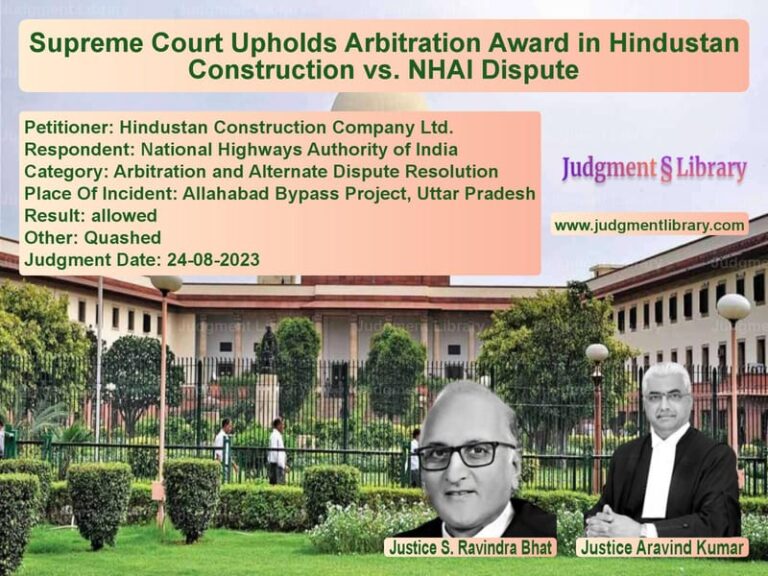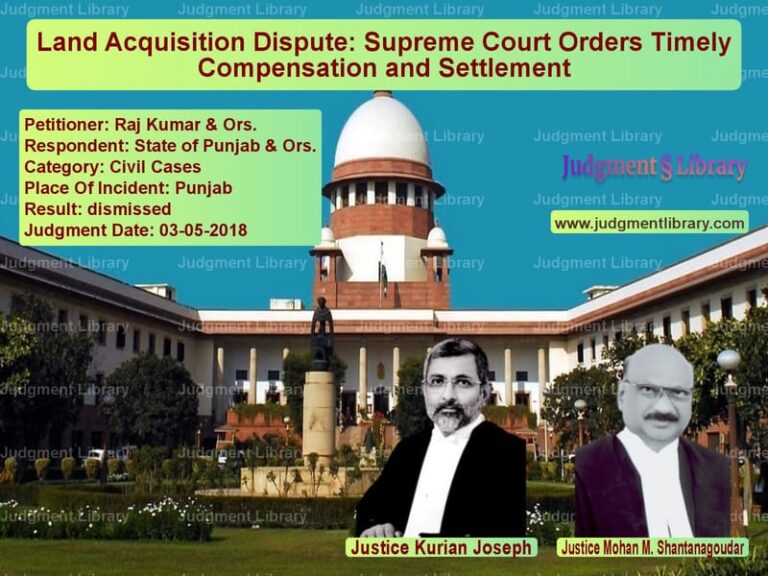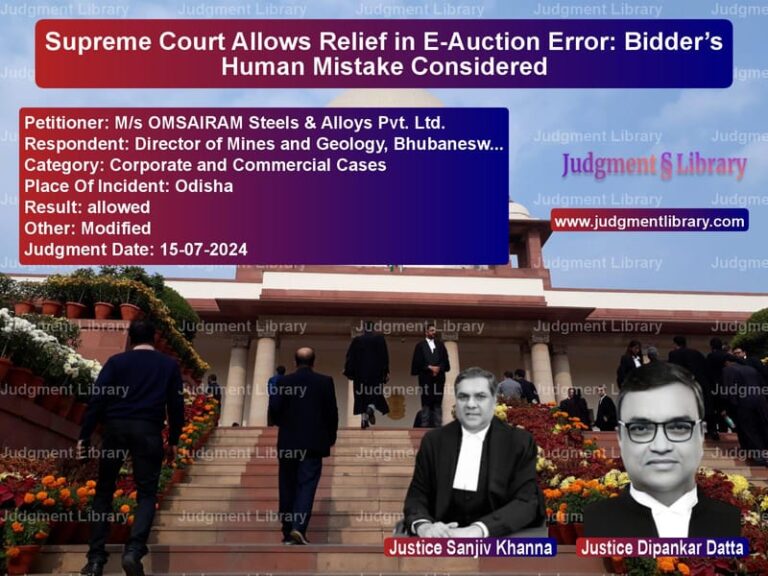Supreme Court Rejects Maharashtra Government’s Demand for Premium on Nariman Point Flats
The Supreme Court of India recently delivered a landmark judgment in the case of The State of Maharashtra & Others vs. Aspi Chinoy & Another, ruling against the state’s demand for a premium on the transfer of flats in Nariman Point, Mumbai. The case centered around whether the Maharashtra Government could impose a transfer premium on flats in Jolly Maker Apartments No. 3, which were built on leased government land. The Supreme Court dismissed the government’s appeal, affirming the rights of cooperative housing societies.
Background of the Case
In the 1970s, the Maharashtra Government leased several plots in the Back Bay Reclamation area of Nariman Point to private developers for residential construction. One such lease was granted to M/s Aesthetic Builders Pvt. Ltd., which constructed a 22-story residential building named Jolly Maker Apartments No. 3.
The original agreement stipulated that after constructing and selling flats, the builder would transfer ownership to a cooperative housing society formed by the flat purchasers. In 1977, the buyers formed Varuna Premises Co-operative Society Ltd., which took ownership of the building and land.
The dispute arose when the Maharashtra Government issued a directive in June 2000, requiring a No Objection Certificate (NOC) from the Collector of Mumbai before registering any flat transfers. The state sought to charge a premium for such transfers, citing two government resolutions:
- Government Resolution of 1983 – Allowed transfer of government-leased lands to cooperative societies at concessional rates.
- Government Resolution of 1999 – Revised the policy and required cooperative societies to pay a premium for transfers.
Flat owners challenged this directive, arguing that they had already acquired ownership through a legal process and that the state had no right to impose further financial burdens.
Legal Proceedings
High Court Decision
The flat owners, led by Aspi Chinoy, filed a writ petition in the Bombay High Court challenging the state’s demand. The High Court ruled in favor of the petitioners, holding that:
- The lease was originally granted to a private builder, not a cooperative society, and therefore, the transfer premium policy did not apply.
- Once the builder transferred ownership to a cooperative society, the state had no further claims over the property.
- The government’s directive was an unwarranted financial burden on homeowners who had already paid for their flats.
Dissatisfied with the ruling, the Maharashtra Government appealed to the Supreme Court.
Supreme Court’s Observations
The Supreme Court carefully analyzed the facts and legal arguments before delivering its verdict.
Arguments by the State of Maharashtra
The government, represented by senior counsel Shekhar Naphade, contended that:
- The flats were built on government-leased land, and transfer premiums were justified under the 1999 Government Resolution.
- The cooperative society fell under Class 9 of the Maharashtra Land Revenue Rules, which allowed the state to impose conditions on transfer.
- Section 40 of the Maharashtra Land Revenue Code empowered the state to dispose of land on its own terms.
- The bye-laws of the cooperative society could not override government rules.
Arguments by the Respondents
The respondents, represented by senior counsel C.U. Singh, countered that:
- The land was not allotted directly to a cooperative society but to a private builder, who then sold the flats to individuals.
- Once the builder transferred ownership to a registered cooperative society, the government had no legal claim over further transfers.
- The 1983 Resolution, which was cited in previous cases, did not apply because the land was acquired through a commercial bidding process, not a concessional allotment.
- The government had no right to demand additional payments decades after the original lease agreement.
Key Judicial Findings
After considering both sides, the Supreme Court ruled:
- The government’s claim was invalid because the land had been leased to a private builder, not a cooperative society.
- Once a cooperative society was formed and legally registered, the state had no further control over property transactions.
- The 1983 and 1999 Resolutions applied only to lands directly allotted to cooperative societies by the government at concessional rates.
- Section 40 of the Maharashtra Land Revenue Code did not empower the state to impose new conditions on completed transactions.
Final Verdict
The Supreme Court dismissed the Maharashtra Government’s appeal, ruling in favor of the flat owners. The key takeaways from the judgment are:
- The government cannot impose transfer premiums on land originally leased to private builders and later transferred to cooperative societies.
- Housing societies in similar situations do not need to pay additional fees for flat transfers.
- The government’s attempt to impose financial burdens retroactively was unlawful.
Conclusion
This judgment is a significant victory for cooperative housing societies, setting a strong precedent against arbitrary financial demands by the government. It affirms that once land has been legally transferred, the state cannot impose additional conditions decades later.
For homeowners in Mumbai and beyond, this ruling provides legal clarity and financial relief, ensuring that their property rights remain protected against retrospective government interventions.
Petitioner Name: The State of Maharashtra & Others.Respondent Name: Aspi Chinoy & Another.Judgment By: Justice B.R. Gavai, Justice B.V. Nagarathna.Place Of Incident: Nariman Point, Mumbai.Judgment Date: 30-09-2022.
Don’t miss out on the full details! Download the complete judgment in PDF format below and gain valuable insights instantly!
Download Judgment: the-state-of-maharas-vs-aspi-chinoy-&-anothe-supreme-court-of-india-judgment-dated-30-09-2022.pdf
Directly Download Judgment: Directly download this Judgment
See all petitions in Property Disputes
See all petitions in Landlord-Tenant Disputes
See all petitions in Damages and Compensation
See all petitions in Judgment by B R Gavai
See all petitions in Judgment by B.V. Nagarathna
See all petitions in dismissed
See all petitions in supreme court of India judgments September 2022
See all petitions in 2022 judgments
See all posts in Civil Cases Category
See all allowed petitions in Civil Cases Category
See all Dismissed petitions in Civil Cases Category
See all partially allowed petitions in Civil Cases Category







